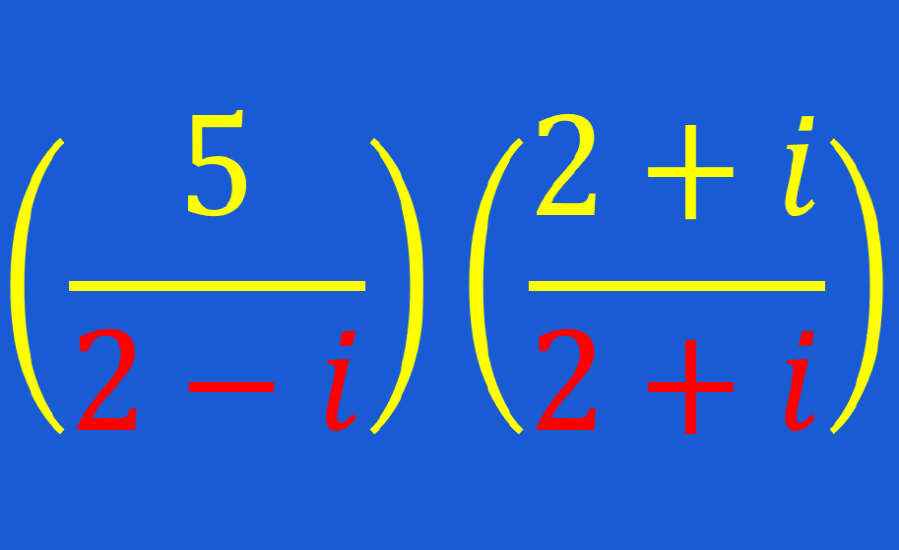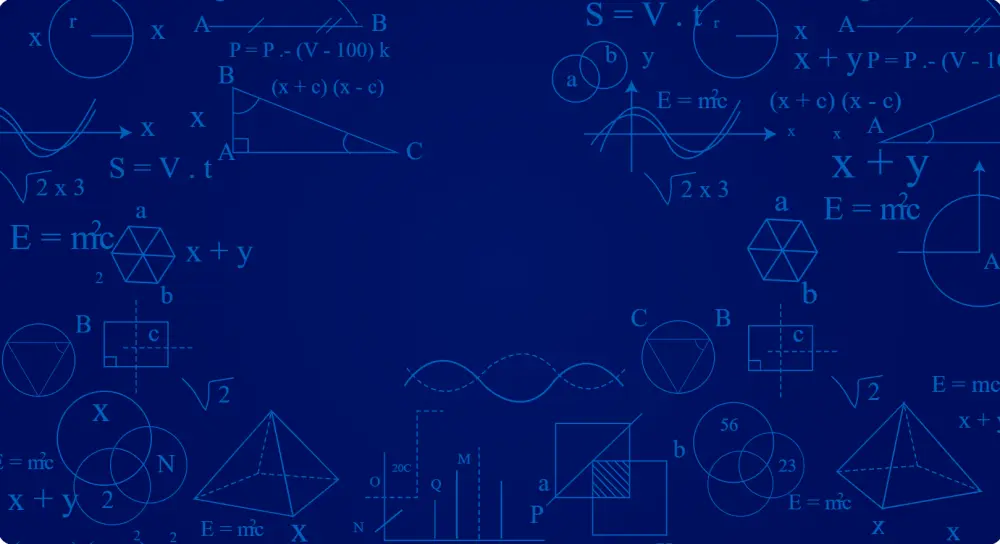To solve exercises with complex numbers, we have to start by analyzing the operation to be performed. If we have addition and subtraction, we simply have to add or subtract the real and imaginary parts separately. If we have multiplication, we use the distributive property to multiply each part of a complex number by each part of the other number. In the case of division, we have to multiply both the numerator and denominator by the complex number conjugate in the denominator.
In this article, we will explore these operations with various problems.
How to solve operations with complex numbers?
To solve operations with complex numbers, we have to remember that the real and imaginary parts are considered separately and that, when we have i², this is equal to -1. The basic operations that we can perform with complex numbers are addition, subtraction, multiplication, and division.
Addition and subtraction of complex numbers
To add and subtract complex numbers, we have to add or subtract the real and imaginary parts separately. For example, if we have the numbers $latex z_{1}=4+2i$ and $latex z_{2}=3+5i$, we calculate the addition of these numbers as follows:
$latex z_{1}+z_{2}=(4+3)+(2+5)i$
$latex =7+7i$
Similarly, if we want to subtract these numbers, we solve as follows:
$latex z_{1}-z_{2}=(4-3)+(2-5)i$
$latex =1-3i$
Multiplication of complex numbers
To obtain the product of two or more complex numbers, we have to use the distributive property and multiply each of the parts of the first number by each of the parts of the second number.
Also, we have to remember that when we have i², this is equal to -1. For example, we multiply the numbers $latex z_{1}=2+6i$ and $latex z_{2}=3+5i$ in the following way:
$latex z_{1}z_{2}=(2+6i)(3+5i)$
$$=(2)(3)+(2)(5i)+(6i)(3)+(6i)(5i)$$
$latex =6+10i+18i+30{{i}^2}$
$latex =6+28i+30(-1)$
$latex =6+28i-30$
$latex =-24+28i$
Division of complex numbers
To solve a division of complex numbers, we have to multiply both the numerator and the denominator by the conjugate of the denominator. Recall that the conjugate of a complex number is obtained by changing the middle sign of the original complex number.
We can solve the division $latex \frac{4+5i}{2-3i}$ in the following way:
$$\frac{4+5i}{2-3i}=\frac{4+5i}{2-3i}\times \frac{2+3i}{2+3i}$$
$$=\frac{8+12i+10i+15{{i}^2}}{4-6i+6i-9{{i}^2}}$$
$$=\frac{8+22i-15}{4+9}$$
$$ =\frac{-7+22i}{13}$$
$$=-\frac{7}{13}+\frac{22}{13}i$$
Problems with answers of complex numbers
The following problems contain various basic operations with complex numbers such as those mentioned above. Each problem has its respective solution that can be used to understand the reasoning and process used to find the answer.
PROBLEM 1
Add the numbers $latex z_{1}=5+8i$ and $latex z_{2}=2+9i$.
Solution
To add complex numbers, we add their real and imaginary parts separately. The resulting complex number has the form $latex z=a+bi$. Therefore, we have:
$latex a=5+2=7$
$latex b=8+9=17$
⇒ $latex z=7+17i$
PROBLEM 2
If we have the numbers $latex z_{1}=a+4i$, $latex z_{2}=7+bi$ and $latex z_{3}=5+7i$, what is the value of a and b if we have $latex z_{3}=z_{1}+z_{2}$?
Solution
The real part of the resulting number is the sum of the real parts of the numbers $latex z_{1}$ and $latex z_{2}$ and the imaginary part is the sum of the imaginary parts of the numbers $latex z_{1}$ and $latex z_{2}$. Therefore, we have:
$latex 5=a+7$
⇒ $latex a=-2$
$latex 7=4+b$
⇒ $latex b=3$
PROBLEM 3
Solve the subtraction $latex z_{1}-z_{2}$ if we have $latex z_{1}=6-12i$ and $latex z_{2}=4+3i$.
Solution
To subtract complex numbers, we subtract their real and imaginary parts separately. The resulting complex number has the form $latex z=a+bi$. Therefore, we have:
$latex a=6-4=2$
$latex b=-12-3=-15$
⇒ $latex z=2-15i$
PROBLEM 4
If we have the numbers $latex z_{1}=a+6i$, $latex z_{2}=-6+bi$ and $latex z_{3}=8-4i$, what is the value of a and b if we have $latex z_{3}=z_{1}-z_{2}$.
Solution
We can subtract the real and imaginary parts of the numbers $latex z_{1}$ and $latex z_{2}$ separately. Therefore, we have:
$latex 8=a-(-6)$
⇒ $latex a=2$
$latex -4=6-b$
⇒ $latex b=10$
PROBLEM 5
Solve the multiplication of complex numbers $latex (3+2i)(4+3i)$.
Solution
To solve this multiplication, we have to multiply each of the terms in the left parentheses by each of the terms in the right parentheses. Therefore, we have:
$latex (3+2i)(4+3i)$
$$=(3)(4)+(3)(3i)+(2i)(4)+(2i)(3i)$$
$latex =12+9i+8i+6{{i}^2}$
$latex =12+17i+6{{i}^2}$
Recall that $latex {{i}^2}=-1$, so we have:
$latex =12+17i+6(-1)$
$latex =12+17i-6$
$latex =6+17i$
PROBLEM 6
What is the product of $latex z_{1}=(5-3i)$ and $latex z_{2}=(-2+4i)$?
Solution
We form and expand the multiplication of complex numbers:
$latex z_{1}z_{2}=(5-3i)(-2+4i)$
$$=(5)(-2)+(5)(4i)+(-3i)(-2)+(-3i)(4i)$$
$latex =-10+20i+6i-12{{i}^2}$
$latex =-10+26i-12{{i}^2}$
Again, we use the fact that $latex {{i}^2}=-1$:
$latex =-10+26i+12$
$latex =2+26i$
PROBLEM 7
Solve the division $latex \frac{5+2i}{3-5i}$.
Solution
To solve a division of complex numbers, we have to multiply both the numerator and the denominator by the conjugate of the denominator. In this case, the conjugate of the denominator is $latex 3+5i$. Therefore, we have:
$$\frac{5+2i}{3-5i}=\frac{5+2i}{3-5i}\times \frac{3+5i}{3+5i}$$
$$=\frac{15+25i+6i+10{{i}^2}}{9+15i-15i-25{{i}^2}}$$
$$=\frac{15+31i-10}{9+25}$$
$$=\frac{5+31i}{34}$$
We already got the answer, but we have to write the real and imaginary parts separately:
$$=\frac{5}{34}+\frac{31}{34}i$$
PROBLEM 8
Solve the division $latex \frac{4+2i}{2+3i}$.
Solution
In this case, the conjugate of the denominator is $latex 2-3i$, so we multiply both the numerator and the denominator by that number:
$$\frac{4+2i}{2+3i}=\frac{4+2i}{2+3i}\times \frac{2-3i}{2-3i}$$
$$=\frac{8-12i+4i-6{{i}^2}}{4-6i+6i-9{{i}^2}}$$
$$=\frac{8-8i+6}{4+9}$$
$$=\frac{14-8i}{13}$$
We already got the answer, but we have to write to the real and imaginary parts separately:
$$=\frac{14}{13}-\frac{8}{13}i$$
Complex numbers – Practice problems
Practice what you have learned about operations with complex numbers by solving the following problems. If you need help with these problems, you can look at the solved examples above.
See also
Interested in learning more about complex numbers? Take a look at these pages:




